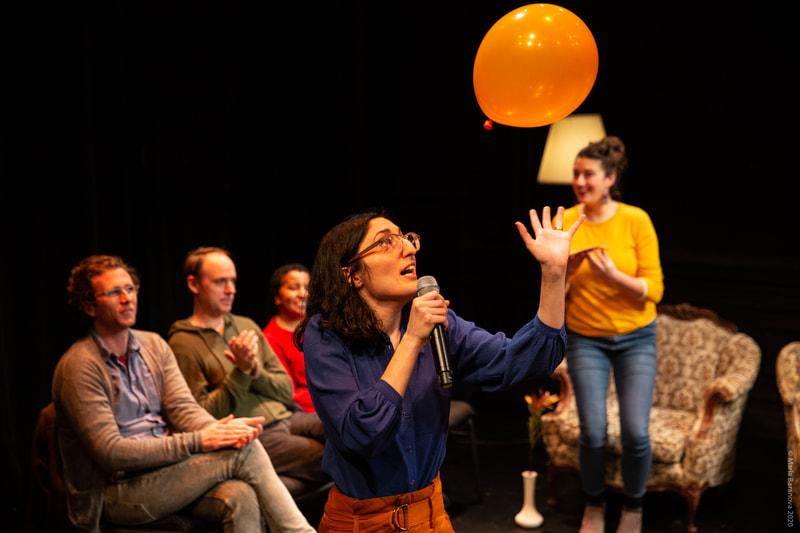‘Disclaimer’ features Iranian stories, promotes openness to diverse perspectives
Tara Ahmadinejad wears a deep blue blouse and gazes at a floating orange balloon. Ahmadinejad wrote the interactive production “Disclaimer,” which showed at UCLA’s Nimoy Theater on Oct. 25 and 26. (Courtesy of Maria Baranova)
By Amy L. Wong
Oct. 27, 2024 9:34 p.m.
“Disclaimer” worked to reframe claims on the relations between the United States and Iran through theater Friday and Saturday.
UCLA’s Nimoy Theater produced three shows of the dramatic play “Disclaimer,” which begins as an anti-war propaganda narrative that later progresses into a murder mystery through interactive crowd work. Written in 2017 around the time of former President Donald Trump’s executive orders banning travel to the U.S. from seven predominantly Muslim countries, the performance explores the fear of losing family, said Tara Ahmadinejad, the writer of “Disclaimer” and the central performer who plays protagonist Chef Nargis. Ahmadinejad said she hopes to relay the personal stories of Iranians effectively.
“There are young people, women hitting the streets … willing to risk their lives because they feel they have no future,” Nargis said. “Something clearly needs to change.”
[Related: Hillel at UCLA hosts West Coast debut of play ‘October 7: In Their Own Words’]
During the live performance, Ahmadinejad – as Nargis – casts people from the audience to represent people in her family. She said she first realized “Disclaimer” was a play and not an essay when she wrote in direct audience interactions. When Ahmadinejad initially presented “Disclaimer” as a reading, she pointed to audience members but did not require them to go on stage. When the show was staged, however, crowd work became a more integrated part of the experience, Ahmadinejad added.

“Disclaimer” was rewritten for the UCLA audience, Ahmadinejad said. She wanted to acknowledge the Iranian community present in the audience because when she originally wrote the play, the protagonist was speaking to a non-Iranian audience for most of the story, she added. Ahmadinejad said this specific performance felt meaningful to her because people in the crowd could now resonate with what she was speaking about, compared to audiences in other locations without as many Iranians in the audience, such as that in New York.
Although the play discusses complex topics such as cultural misrepresentation and propaganda, Rory Leech, an attendee of the show, said he believed the play is humorous without sacrificing the dramaturgical subtext. He said he enjoyed the audience interactions in the murder mystery because it allowed the story to feel more accessible, heartfelt and personal.

In addition, Bradford Nordeen, another attendee of the performance, said he thought the show dissected politics through a strong narrative. He added that he enjoyed the use of pizza boxes as a motif to signal to the participants and audience members that their character no longer had an active role in the scene. Allen Riley, who also attended the performance, said the crowd work was enjoyable enough to watch the show many times because it felt as though the audience was involved in crafting the unique experience together.
“Every time that I’ve seen it, the subtle ways that all the participants differently interpret their roles is really beautiful to see,” Riley said. “There’s always some surprises with those moments.”
Riley said he watched performances of “Disclaimer” at the Under the Radar Festival in New York in January 2020, on Zoom in 2021 and again Friday and Saturday. He said the creators were clever in adapting the play to Zoom with multi-camera video editing and streaming software to incorporate participants by filming the audience.
During the performance, Nargis described the emotional pain she felt when she learned about what happened Sept. 11, 2001. Nargis said she was in high school and watched what happened on television in an assembly room. After that, Nargis’ teacher began instructing as normal to distract the students from the tragedy. During the lesson, Nargis said she started sobbing and told her teacher she was afraid she would never see her family from Iran again.
[Related: Gramian-Emrani Center for Iranian Music opens, fostering cultural understanding]
The play balanced heavy topics with melodramatic sounds for humorous effect to relieve pressure, said Ben Vigus, the sound designer and co-video designer of “Disclaimer.” Vigus said the sounds inform the audience that a new part of the play has begun and act as a guide to the emotions, suspense and drama. He added that including jokes allows the audience to feel comfortable and more receptive to the deeper parts of the show. Consequently, Ahmadinejad said she hopes that by engaging with “Disclaimer,” the audience will be open to more diverse perspectives.
“We all have a certain personal lens, … and so if we understand that about each other, then it would be easier to understand each other together,” Ahmadinejad said.
